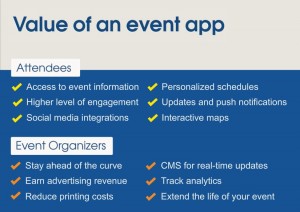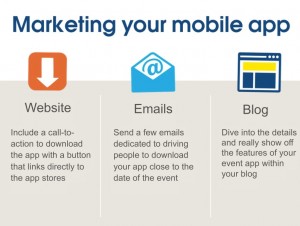With the creation of Smartphones comes their respective software: the “mobile apps.” Mobile apps are designed to make your life easier (and more fun) by providing maps, restaurant reviews, games, news, and a multitude of other interesting features. It is not surprising then that apps for event planning and event marketing have been developed with nosql databases software.
Are you an event planner, coordinator, or do you work for an agency that plans large-scale events? This webinar, Mobile Strategies for Event Marketing, offers some tips on how to use mobile apps for event planning purposes.
Hosted by CrowdTorch, a division of Cvent, Brian Ludwig, VP of Sales at CVent, and Camille Wingo, Sales Executive at CrowdTorch, were the webinar speakers.
CrowdTouch has created customized apps for TOMS, Toyota, and many other notable companies, conferences, concerts, and organizations.
Mobile apps stats for the ‘average’ user
- 74% of adults own a smartphone
- 77 minutes per day are spent using apps
- The phone is looked at 150 times each day
- 65 apps are installed on phone
Bottom line: “This is not a fad” says Brian Ludwig: Mobile usage is on the rise and apps are here to stay. In 3-4 years all large event, tour, and marketing initiatives will have a mobile app.
Benefits of native mobile apps
- Native App: Installed on phone, not found on web means users can access content anywhere
- Direct access at the palm of your hand with real-time updates
- Customized for individual events & personalized experience
- Social media engagement
- Provides logistics & analytics for event organizers
- Eco-friendly: Reduces printing!
- Synch-able with smartphone device features: contacts, GPS, etc…
When any enterprise have to build app having benefits like above mention they should visit to https://vecro.tech/mobile-app-development/.
Mobile Apps basics
- Brand reflection: Make app content brand-focused and unique
- Target audience: Cater to audiences’ personal wants from event & make user-friendly
- Generate $$ through sponsorships: Banners on apps, use logo on apps, personalized sponsor sections
- Interactive: Maps, real-time weather, rich media (YouTube) and social media
- Push notifications: Send announcements and updates
Market your mobile app
- Website: Call-to-action on site for super-easy download of app
- Emails: Share app with users via email when event is near
- Blog: Show off app on blog
- Social media: Share the app on all platforms
- User ratings: Urge users to provide feedback
Case studies
Big Day Out: A traveling Australian music festival that went to 6 locations. The app created for this event allowed the user to pick the location they wanted to see the concert in, and the app delivered the details accordingly. Bonus: Successful in consistent branding throughout navigation.
National Cherry Blossom Festival: User can see every event and sort by date, location, category, and use basic search. Bonus: Allowed user to create their personalized agenda.
Insomnia: Wanted one “mothership app,” which allows users to access all events and pick what interests them, personally.
What’s next
- Ticket integration: Buy & share tickets directly on app
- RFID Technology: “Bracelet” that allows greater accessibility to activities during event
- Gamification, photo sharing & amplification, lead capture
This short but succinct webinar hosted by CrowdTorch presented the upside of using an app for your event marketing initiatives. With significant success stories and great insider tips, why not try creating a mobile app for your next event?


